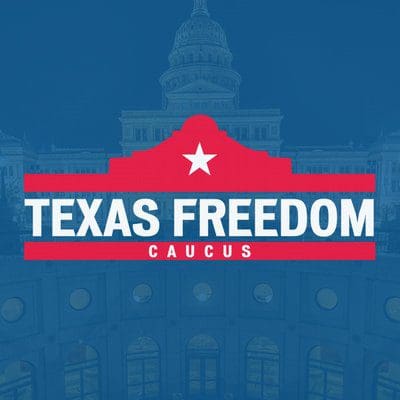Following the last legislative session, conservative activists and donors across Texas expressed dismay with what they believed to be lackluster results. We’ve reported the reasons for the general discontent from the Republican base here and here, as well as their veiled threats to put away their checkbooks.
According to the first financial reports of 2020, conservatives seem to be making good on those threats—the top conservative donors and PACs from around the state were, indeed, conspicuously missing. And conservative House representatives appear to be the ones taking it on the chin.
The Freedom Caucus is a subset of Republican House members who generally rank as the most conservative. According to their purpose statement, “The Texas Freedom Caucus … [is] committed to amplifying the voice of liberty-minded, grassroots Texans who want bold action to protect life, strengthen families, defend the U.S. and Texas Bills of Rights, restrain government and revitalize personal and economic freedoms in the State of Texas.” From the looks of their campaign accounts, it seems conservative donors don’t think the Freedom Caucus lived up to its rhetoric.
Here’s a look at how the Freedom Caucus fared on the first financial reports after this (2019) session compared to how they did on the first financial reports after the last session (2017).
| July, 2017 Report | July, 2019 Report | Change | |
| Mike Lang, Chair | $121,605 | $4,860 | ($116,745) |
| Bill Zedler, Vice Chair | $11,300 | $19,890 | $8,590 |
| Kyle Biedermann | $75,716 | $22,153 | ($53,563) |
| Briscoe Cain | $168,446 | $17,568 | ($150,878) |
| Matt Krause | $30,510 | $56,730 | $26,220 |
| Matt Schaefer | $27,060 | $0 | ($27,060) |
| Matt Shaheen | $61,835 | $34,640 | ($27,195) |
| Valoree Swanson | $29,760 | $40,935 | $11,175 |
| Tony Tinderholt | $54,702 | $26,820 | ($27,882) |
| TOTALS | $580,935 | $223,596 | ($357,339) |
Note: This chart does not include House Rep. Mayes Middleton because 2019 was his first session. Middleton’s account reflects total contributions of $300,105, but $300,000—all but $105—of that was a donation from himself. Likewise, this chart does not include House Rep. Jonathan Stickland because he announced his retirement from the House before these financial reports were due.
Key Takeaway:
Overall, the Freedom Caucus only took in 38 percent of what they took in during the same time frame after the last legislative session. Overall donations were down more than $350,000. Six of the nine members reported a drop in contributions.
Noteworthy Representatives:
House Rep. Briscoe Cain — Cain felt the most precipitous drop compared to the 2017 cycle, down $150,878 (90 percent).
House Rep. Bill Zedler — The vice chair of the Freedom Caucus was one of only three members to report an increase. However, his total came from only one in-kind donation from House Speaker Dennis Bonnen’s campaign account as payment for polling. He reported $0 in contributions from anyone else. Zedler won reelection in 2018 by less than four percentage points, making him a likely target for Democrats in 2020.
House Rep. Matt Krause — Another one of the three Freedom Caucus members to report an increase from the same time period in 2017, Krause received a $19,890 in-kind donation from Bonnen’s campaign for polling, making his increase over 2017 only $6,330. Krause also likely faces a tough re-election campaign, as he won last time by less than 8 points.
House Rep. Valoree Swanson — Thanks to a $25,000 donation from fellow Houstonians, Holloway Frost and Kathaleen Wall, Swanson is in a better position this time around.
How Bad Is It?
Four of them held onto their seats in the last election by less than ten percentage points: Zedler (3.71 percent), Krause (7.73 percent), Shaheen (0.57 percent), and Tinderholt (8.9 percent). Democrats have set their sights on taking control of the Texas House in 2020 (and with it the all-important redistricting process), and they only need to flip nine seats to do it. With slim margins of victory and reputations as conservatives, these Freedom Caucus members will likely find themselves in some of the most hotly contested races of 2020.
In a sense, these lawmakers find themselves without a “tribe.” Will they moderate their positions to appeal to more liberal PACs and donors? Will they seek to convince conservatives they’ll “do better next time,” or maybe that they did their best and should be rewarded for their effort?
Whatever the case, we’ll be watching and bringing you the answers you need about the money in Texas politics. Join us and get the latest news delivered straight to your inbox.
This is a commentary submitted and published with the author’s permission. If you wish to submit a commentary to Texas Scorecard, please submit your article to submission@texasscorecard.com.





